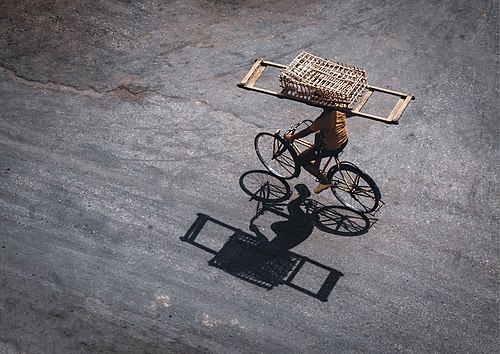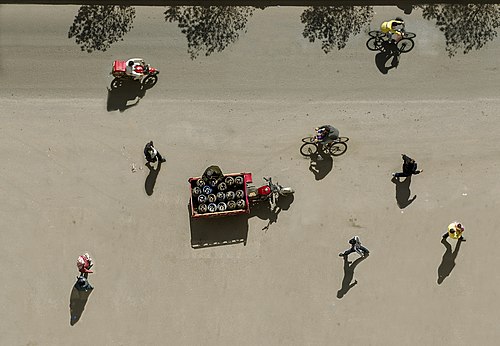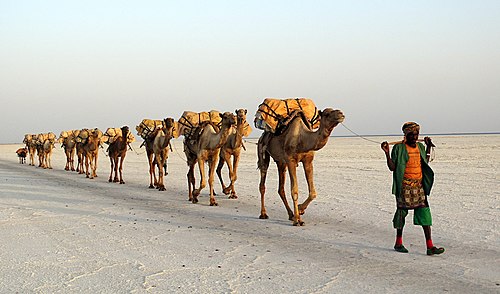Commons:Wiki Loves Africa 2020/Results and best practices

This page gives a description of how Wiki Loves Africa 2020 was organised, the outcomes, and some of the important lessons we drew.
See also
- Results and best practices 2014
- Results and best practices 2015
- Results and best practices 2016
- Results and best practices 2017
- Results and best practices 2019
- Results and best practices 2020
- Results and best practices 2021
- Results and best practices 2022
- Results and best practices 2023
Wiki Loves Africa - the 6th iteration - was held from 15th February until 15th April 2020 under the theme Africa on the Move! (Transport). This year, 23 Wikimedia communities (including Brazil) officially took part in preparing events and creating local noise around the contest. As usual, the media competition accepted entries from across Africa, and from people outside Africa, as long as the images represented African-related material or content.
The contest resulted in 16,982 media files from 1,904 competitors in 53 countries. 75% of those competitors were new to Commons. The images have since been viewed 3,156,246 during June 2020, with 6,893,850 views since they were collectively submitted. Current usage of the images stands at 14.79%.
Four photography and one video prize winners were announced, along with 5 highly commended images. The winning images and featured images were chosen by a panel of nine international professional and Commonist photographers from Botswana, Zimbabwe and Uganda to Netherlands and France.
This page exists as the sole and full report for Wiki Loves Africa 2020.
Organization and credits
[edit]Now in our 6th year, the competition team is well versed in the process of putting the competition together. It is not possible to do this without the key help of people from within the community and we are endlessly grateful for their help in doing so.
This year there was more hands-on help came from within the African community, due to a special call to join the Organising Committee with key tasks being outlined in the updated Activities section. We would like to thank the Wikimedia community across Africa (and beyond). This is as much their competition as it is ours and is intended as a platform for them to help build their communities through a celebration of local culture and experiences.
There are also key people that provide continual assistance in the set-up of the competition on, and communication across the Wikimedia projects, this is no small task - thanks to Romaine, Seddon, among others. There was assistance with translation and communications thanks to Ella Mahoro and Fawaz, Erina Mukuta’s assistance with Montage, and then with vetting and checking of the images as they came in or helping with useful tools (thanks to GuillaumeG, T Cells, Ji-Elle, and collectively as the first review team (too many names to mention here!). Lastly, the infatigable work of the International Jury.
Introduction
[edit]Wiki Loves Africa - the 6th iteration - was held from 15th February until 15th April. The initial dates of the contest were decided on by the Wiki Loves Africa organizers community via a poll on Telegram. The theme was chosen as Africa on the Move! (Transport) after discussions during Wikimania 2019 and feedback offered on the m:Wiki Loves Africa 2019/Survey.
This year, 23 communities (including Brazil) officially took part in preparing events and creating local noise around the contest. As usual, the media competition accepted entries from across Africa, and from people beyond Africa, as long as the images represented African-related material or content.
Due to the use of a new Telegram group over Facebook group or email, there was a lot more engagement from the local organizers. This meant decisions could be taken quickly, new members onboarded more rapidly and by more old-timers; but it was also way more pleasant!
Main links
- Commons portal : https://commons.wikimedia.org/wiki/Commons:Wiki_Loves_Africa
- Meta portal (for organizers) : https://meta.wikimedia.org/wiki/Wiki_Loves_Africa_2020
- Website : http://www.wikilovesafrica.net
- Facebook page : https://www.facebook.com/wikilovesafrica/
- Twitter handle : https://twitter.com/wikilovesafrica
- YouTube: https://www.youtube.com/playlist?list=PLvyE0yEt-BKgEUM5QlcQOwsMtpbWCbsnA
- Telegram : https://t.me/joinchat/FI9fz0pnPNiWbyyLr-YsFQ
New Elements
[edit]Now in our 6th year, the competition team is well versed in the process of putting the competition together. However, every year is the opportunity to challenge our previous processes and operations. Here is a list of new elements for this year!
- Updated and enhanced Organizers portal on Meta that included additional features such as:
- How to join
- Participating countries including links to their grants and information such as lead person, and competition pages.
- An Online session page to ensure that all information with regards to the international team were recorded
- A national Judging Charter to ensure that expectations and guidelines with regards to hosting national jury processes and winners are clear
- Tools section that lists a complete compendium of all the tools used to build the competition, thereby assisting future competition organizers.s
- The Wiki Loves Africa 2020 competition page on Commons was redesigned and new features added, these included:
- A countdown timer
- A prominent ‘upload button’
- A more prominent ‘entries’ button
- Updated Rules
- Upload wizard tutorial video created and published
- Entirely updated and revamped website: www.wikilovesafrica.net
- New prize category: Video
- Telegram group of all organizers
- Initial group meetings to collectively support and discuss elements of the competition for organizers:
- 1st Jan 2020 Orientation meeting
- 20th January 2020 Introduction to Commons and copyright, and Wiki Loves Africa rules,
- 8th February 2020 - Competition communications
- 14th March 2020 - Discussion on how to cope with WMF event ban
- 16th April 2020 : Wiki Loves Africa Local Jury Process
- Webinars as a response to COVID-19
- French Webinar took place on March 27th. It was recorded and is available on YouTube. See more details here Commons:Wiki Loves Africa 2020/Comment participer à Wiki Loves Africa tout en restant chez nous
- English Webinar for Photographers took place on 28th March 2020 at 13h00 UTC.
- Arabic Webinar was held. You can view it on [1].
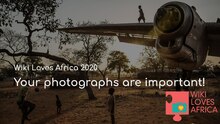
- Jury process:
- National judging Charter - due to different situations in 2019 and in 2020, we decided to create a Charter to ensure best practices with regards to the National Juries and National competitions for Wiki Loves Africa. The document is available with comments here : National Judging Charter
- International jury page was updated with photos and links to their portfolio pages (where possible) as well as detailed biogs. There was also a social media campaign introducing the jury, and a similar page on the website.
- A Telegram group with restricted access was created for the Jury
- Communications:
- An @openGLAM takeover on Twitter took place during the first week of July: the entire series can be viewed on this Google doc.
- Partnership and alliances
- a long-term alliance is being discussed with the Everyday Africa project
- We decided to support and join the WPWP contest (https://meta.wikimedia.org/wiki/Wikipedia_Pages_Wanting_Photos) in particular to provide a specific prize category for the insertion of images into several African language wikipedias. We provided a list of suggestions and prize categories for the WPWP contest running July-Aug 2020. WPWP is currently ongoing. Outcomes will be in the final report.
- Jungle Bus. We partnered with Jungle Bus, the company from the OpenStreetMap community which loves to map transit in OpenStreetMap. Given that the topic of the annual picture contest was about transports, they joined it and promoted the contest. Their page : c:Category:Jungle Bus Paratransit contest
- Research study : In 2020, a full study was run with CAT Lab (previously CivilServant). It tested whether posting a message on the talk page of a former participant made a difference (See Description of the process by Anthere here). Study found out it did...
Training material
[edit]Wiki Loves Africa is a first entry space for most photographers to the Wikimedia Projects - on average, 82% of competitors are brand new to the Wikimedia projects. The 2020 focus for WIA has been how to ensure clear pathways for people to access the Wikimedia projects further and to build their digital skills and knowledge, in this case through information on copyright, licencing, metadata usage and correct categories, descriptions and image depictions. With this in mind, 2020 has become about acknowledging and developing clear instructions, guidelines and pathways of entry for organizers and new competitors alike.
- The upload wizard tutorial made in English to assist new contributors and walk them through what to expect from the Wiki Loves Africa Upload Wizard.
- Additional materials, including the webinars, can be found at this link to the category: c:Category:Wiki Loves Africa training material
- Entirely new tips section on the website providing vital photographic framing knowledge.
Communications
[edit]Communications materials
[edit]A meeting was held in February specifically about communications with as many organizers as could make the meeting.
Communications materials for printing and for online usage were developed by Creative Flood, and branded social media posts were created by Isla in several batches according to the campaign needed at the time, including : launch, extension and then #stayathome campaigns,etc. You can access the printable materials here c:Commons:Wiki Loves Africa 2020/Media#Documents
The following communications channels were entirely overhauled and redesigned:
- Meta organizers and project portal
- Commons upload and competition portal
- Website: www.wikilovesafrica.net
The following communications elements are available here and were created:
- Wiki Loves Africa 2020 international poster
- Wiki Loves Africa 2020 local information poster template (requiring information to be added)
- Wiki Loves Africa 2020 Local Events Template as PDF(requiring information to be added)
- English launch press release
- English template of the launch press release (requiring information to be added by local teams)
- Incomplete list of mentions of Wiki Loves Africa in the local media
- Launch-specific Newsletter to 1,014 Wiki In Africa English Newsletter subscribers
- Launch press release sent to 230 media contacts across Africa
- English winners press release (to come)
- English winners newsletter (to come)
Social media campaigns
[edit]Social media campaigns proved to be very successful. Materials for Social media were developed by Isla using the Canva platform. All materials can be found at this Google link.
Campaign series’:
- Launch: PR
- COVID-19 extension + Webinars
- Meet the Jurors series
- National Prize Winners series
- @openGLAM takeover on Twitter
- International Winners series (early August)
- Link: https://www.facebook.com/wikilovesafrica/
- Posts
- 57 posts
- 4 boosted
- 2 adverts (English, French), with a simple A/B testing
- Page Likes increase:
- Jan: 7,240
- July: 34,394
- Predominantly male
- Predominantly from South Africa, although this changes significantly with the targeted audience through advertising (advert target groups make a difference)
- The overwhelming majority are using mobile - this should influence ensuring that the Commons and website pages are clear on mobile
- Adverts are definitely the way to build likes and engagement
- The targeted campaigns with the addition of two specific advertising push (1 in English and 1 in French) increased the number of page likes on Facebook from 7238 on 1st January 2020 to 34,457 (22/07/2020).
- Link: https://twitter.com/wikilovesafrica
- Followers: 1,493 Followers (July 2020)
- Wiki Loves Africa twitter page has increased its followers by 244 since January through 83 tweets
- The @OpenGLAM takeover consisted of Wiki Loves Africa’s @havingaflood publishing 33 tweets to show the full Wiki Loves Africa stories. All tweets are recorded in this Google doc. This ‘takeover’ allowed for exposure through an aligned movement - open GLAM. It resulted in 35 new followers.
- 80 posts (29 posts during Wiki Loves Africa 2020)
- 851 followers (increased by 35% from 553 in July 2019)
- 263 following
More needs to be done to increase engagement on Instagram - at the moment it is another space for similar materials that are fed to FB and Twitter. A specific Instagram campaign will be looked at in the 2nd half of 2020 to encourage more engagement, and hook new potential audiences for Wiki Loves Africa 2021.
Jury process
[edit]The Jury process was headed up by Isla Haddow-Flood with assistance on Montage from Erina Makuta and Alexander from the Montage team.
National Jury process
[edit]National teams could decide to host their own jury process, or not. Their process would not impact on, and were completely independent of, the decisions taken by the International Jury. National teams wishing to host a jury process were invited to a meeting on the 16th April 2020, after which a page outlining guidelines was shared. This page of guidelines was then developed in the National Judging Charter to ensure uniform clarity, understanding and collective agreement as to the best and most ethical practices.
International Jury process
[edit]The International Jury process started in May. There were 9 members of the jury from across Africa and Europe. The mix featured professional photographers and experience Commonists. The process was conducted on Montage. The communication for the jury process communication has been documented in this Google doc. This was the expected timeline and procedure to follow:
- First Review Round (8th-18th May) - yes / no round: a group of Commonists and Wikimedians who will do the initial weeding out (the First Review). They were a group of 30 from 50 volunteers, and were a different group to the International Jury.
- First Jury Round (deadline: 10th June) - first yes / no round for jury.
- Second Jury Round (deadline: 23rd June) - rated round - 5 stars
- Third Jury Round (deadline: 8th July) - yes/no to select top 30 images
- Final Jury Round (deadline: 16th July) - ranked round to select top 10 images, with motivations for top 3 images.
- zoom meeting and discussion (17th July) - final discussion and selection among those jury members who could make it.
First reviewers
- Images reviewed: 17,000
The initial round - first review round- was made up from volunteers who responded to a call that went out through various groups (Telegram, Facebook and then on the Commons village pump). 50 people filled out the Google form. 45 people were part of the reviewing team. This meant that each image was seen 3 times. Each reviewer looked at 1180 images. The criteria for their yes/no choice was based on the following:
- Images must be relevant to the theme
- Images should be at a useable size ('no' for images lower than 3mb)
- The obvious quality of the image - is it obviously blurred, pixellated, etc.
- The should be no watermarks or logos or timestamps
- Basically, all selfies, small images or blurred and unclear works should be marked as “no”.
First Jury round
- Images reviewed: 3,551
As mentioned, this is a yes / no round. Please do not vote for any image just because it is in-scope no matter how badly composed or structured. Please do consider the following elements:
- Encyclopedic value – does the photo present the subject with clarity?
- Subject Matter – is the subject appropriate to the theme Africa on the Move (Transport)?
- Story Telling – how well does the photo evoke the viewer’s imagination or attention?
- Impact – what do you feel when you first view the photo. Does it evoke an emotion?
- Creativity – has the photo captured the photographer's idea, message or thought in an original and imaginative way? Without distracting from the knowledge provided by the image.
- Please also consider technique, composition, presentation, color balance, lighting and focal point/s
- Of course, the photos should be in focus (unless intended not to be) and should be more than 3 mb
Jurors were to vote "yes" for any image that you like (the framing, emotion, visual composition, etc.) and feel should be rewarded and vote “no" if a) they think the image was bad, blurred, not clear, poorly constructed photo, or b) if they felt the photo is not relevant to the theme.
Second Jury Round
- Images reviewed: 1,053
This was a rating round intended to bring down the photographic pool to a manageable shortlist. For this round, the jury were asked to rate each image according to 5 stars, with 5 stars meaning exceptional and 1 star meaning the image should no longer be considered. The Jury were asked to consider the criteria listed for Jury Round 1.
Third Jury Round
- Images reviewed: 454
The Jury were asked to assess the images on this criteria:
- Technical quality: please keep the 'Featured Pictures' criteria of Wikimedia Commons [1]. This is especially relevant for resolution (a minimum resolution of 3 Megapixel is generally used), and digital manipulations (must not deceive the viewer). Community jury members, please could you check these factors and communicate any concerns on Telegram or during the discussion phase.
- Originality: it is probably clear what is meant: going beyond the usual and obvious, giving the photo some artistic quality.
- Usefulness: refers to usefulness in Wikipedia articles: the image must be clear, helpful in showing the monument or its details etc. It is not enough to be a 'pretty image' but it must also have descriptive value.
Fourth Jury Round
- Images reviewed: 27
Jurors were asked to rank their final 10 images with a motivation for their top 3.
Winners
[edit]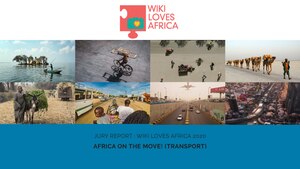
International winners and prizes
[edit]Four photography and one video prize winners were announced, along with 5 highly commended images. The winning images and featured images were chosen by a panel of nine international professional and Commonist photographers from Botswana, Zimbabwe and Uganda to Netherlands and France.
-
1st Prize Winner: My Homeland (Egypt) by User:Myousry6666
-
2nd Prize Winner : توزيع الخبز على دراجته by Abd Elhamid Fawzy Abd Elhamid Tahoun User:Abdo tahoon
-
3rd Prize Winner: A Mess by User:Summering2018
-
Traditional Culture Prize: Salt transport by a camel train in Ethiopia by User:LeFnake
-
Video Winner: Le Transport Lagunaire à Abidjan STL réalisé by Bouba Kam's
In addition, the judges selected their personal favorites as highly commended images:
Prizes
At the international level, there are 3 main prizes for Wiki Loves Africa, and as with last year, there will be two additional prize categories for photos and media. The international prizes are:
- 1st prize: US$1000
- 2nd prize: US$800
- 3rd prize: US$500
Additional categories are:
- Culturally specific or traditional representations of transport or structures that facilitate transportation : US$500
- Prize for best quality video (audio and visual quality and storytelling will be taken into account): $500
Each winner will also receive a pack of goodies (proposed: a hat "I edit Wikipedia from Africa", a branded battery, stickers)
National winners
[edit]To be completed after all national winners are announced. As a reminder, selection of national winners is dissociated from the selection of international winners'
Individual events and country pages are visible here : c:Category:Wiki Loves Africa 2020 Events
16 countries have done national selection with prizes : c:Commons:Wiki Loves Africa 2020/National winners
Impact
[edit]Overview
[edit]The contest resulted in 16,982 media files from 1,904 competitors in 53 countries. 75% of those competitors were new to Commons. The images have since been viewed 3,156,246 during June 2020, with 6,893,850 views since they were collectively submitted. Current usage of the images stands at 14.79%. Other stats include:
- Participating Countries: 21 via WMF grants, 2 despite no WMF grant (Egypt, Sudan)
- In-person events: ? (unable to tally this due to COVID and Rapid Grant’s not yet being finalised)
- Online events held included:
- 3 webinars to assist increasing entrants’ understanding of the competition and
- 5 meetings with organizers of local events in order to clarify issues and concerns, discuss challenges and confirm expectations.
Full statistics for the life-span of the Wiki Loves Africa contest can be found in the table below:
| Year of competition | Images entered | People contributed | Monthly page views 04/20 | Countries participating | Total page views: 05/20 | Months tracked | Percentage usage (04/20) | Uploaders registered after competition start | % Uploaders registered after competition start |
|---|---|---|---|---|---|---|---|---|---|
| 2014 | 5,868 | 873 | 21,845,810 | 47 | 134,204,188 | 41 | 16.86 | 735 | 83 |
| 2015 | 7,352 | 722 | 4,016,396 | 48 | 126,306,449 | 41 | 9.81 | 585 | 80 |
| 2016 | 7,768 | 836 | 2,787,406 | 49 | 71,804,588 | 41 | 6.8 | 682 | 80 |
| 2017 | 17,874 | 2,435 | 6,825,206 | 55 | 116,212,241 | 21 | 7.94 | 2,307 | 88 |
| 2019 | 8,212 | 1,350 | 1,671,142 | 53 | 14,441,849 | 14 | 9.02 | 1,157 | 85 |
| 2020 | 16,982 | 1,904 | 3,737,604 | 53 | 3,737,604 | 1 | 14.79 | 1,448 | 76 |
| Totals | 64,056 | 8,120 | 40,883,564 | 50.83 | 466,706,919 | - | 10.87 | - | 82.00 |
More stats available here : c:Category:Wiki Loves Africa Stats
2020 Survey results
[edit]The WLA 2020 survey will be run around September 2020 using a Qualtrix account. For reference, 2019 survey information is published here : m:Wiki Loves Africa 2019/survey
Lessons and comments
[edit]Unexpected that we faced
[edit]COVID-19 and our response
[edit]The pandemic hit in the middle of the Wiki Loves Africa contest, but we took the measures needed. The local teams confined and naturally stopped physical meet-up, edit-a-thons and such. They were worried about the winning ceremonies though, wondering if they had to cancel them or whether those could be delayed, which would impact the timeline of their own Rapid Grant.
- We contacted the Rapid Grant team to make sure there would be flexibility regarding rapid grant timeline. This was confirmed and we informed the teams about that. We suppose that some will delay their own ceremonies, whilst others might cancel them.
- We extended the contest by 15 days to provide opportunities for local teams to find solutions to replace upload sessions.
- Several online webinars were organized on Zoom, English, French, Arabic, and were posted on Wiki in Africa YouTube channel Wiki Loves Africa Playlist. [meta:Wiki Loves Africa 2020/Online View more at the online page]
- New material was created and used in communication to invite participants to search in their stored images rather than taking pictures outside

Political borders on maps…
[edit]We created a map for Wiki Loves Africa 5 years ago and used it on social media, to illustrate the meta portal, and to illustrate the event page on Commons. That visual is a map of Africa and displays participation information. What we had not anticipated was a dispute over country borders… After a bit of discussion, the issue could be resolved to everyone's satisfaction with a rephrase of map description and the creation of an alternate map for local use. https://commons.wikimedia.org/wiki/File:Wikimedia_Affiliates_participation_to_WLA_2020.png
Eswatini
[edit]We had not noticed the renaming of Swaziland into Eswatini… and the whole category system set up by Romaine before the contest was still using Swaziland. A Commonist renamed all the relevant categories without warning, and broke quite a few things on the way. Most of it was fixed, but not some of the analytical tools. So for example, all information (and participation figures) are missing from https://wikiloves.toolforge.org/africa. The tool now features… neither Swaziland, nor Eswatini… To be fixed before 2021…
What worked well (or, at least, better than last year)
[edit]- Community Home Page on meta completely redesigned by user:Bachounda and User:Anthere to improve the usability
- Excellent improvement to documentation/support pages, such as (to name a few)
- Complete visual overhaul to the competition pages on Commons
- Complete visual and content overhaul of website
- Images description, categorization and insertion in Wikipedia, thanks to user:Jielle
- Greater discussion and consultation with National Organizers
- No less than 15 teams selected National Prizes this year! c:Commons:Wiki Loves Africa 2020/National winners
What did not work so well
[edit]- We had issues with teams not using the upload wizard and therefore having issues with the categories. This actually happens every year…. But this year, it was particularly difficult to fix, especially due to Petscan tool not working. But we managed! user:GuillaumeG provided invaluable help to clean that. See this page created to support the clean-up : Commons:Wiki Loves Africa 2020/Images checking and link to the bot that did part of the clean-up).
- We asked for several people to get involved with social media, especially with regards to translation, but this was difficult to coordinate on the fly especially with the crisis getting more difficult. For example, the Instagram account: in spite of calling for volunteers to manage the Instagram account and really do a big campaign over there, this year was again quite a disappointment :(
- The national winners in Guinea caused an upset. This was partially due to the organiser not understanding how Montage works, and also partly due to a frustration with the system, and many images discarded from the Montage system due to a low resolution. In the end, the organizer awarded himself 1st and 3rd prize in the National Winners (c:Commons:Wiki Loves Africa 2020/National winners). We have told him this is not good practice and suggested he “reset” the national prizes selection in Guinea. So far… no change.
Continued impact of the Wiki Loves Africa project
[edit]Since 2014, the Wiki Loves Africa project has achieved the following things:
- Over 64,000 images have been entered by 8,120 competitors from up to 55 countries under a free licence (CC-BY-SA) ;
- The images entered to Wiki Loves Africa are viewed nearly 41 million times each month (June 2020)
- Wiki Loves Africa’s images from the first 6 years have been viewed 484 million times altogether (June 2020)
- Wikimedia communities from 24 African countries have hosted participation events, information sessions and training workshops; this year, the African-Brazilian community also got involved
- Over 250 participation and training events have been held up until 2020 where a spate of local COVID-inspired online events happened for the contest in early 2020;
- The competition attracts high levels of new contributors to the Wikimedia projects – an average of 82% of participants are new contributors;
- A Wiki Loves Africa prize-winning image was included in the Journeys Through Our Fragile Heritage exhibition at the UNESCO headquarters, Paris, and
- Wiki Loves Africa’s ISA tool is a pilot project for Structured Data on Commons and the winner of the WikiData Award for Best Multimedia Tool in November 2019.
What is still pending (next steps)
[edit]- Announcement of winners (early August)
- Jury report (early August)
- Mass messages study results to be announced in early August
- Gifts to winners (August-September)
- Results of WPWP participation (September)
- End of project survey to be sent to local organizers (September)
- WLA video creation for lead up to 2021


